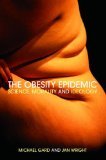 The Obesity Epidemic: Science, Morality and Ideology
The Obesity Epidemic: Science, Morality and Ideology
Michael Gard & Jan Wright
Routledge, £22.99, ISBN 0415 31896-3
Concern about obesity is nothing new: even Hippocrates saw it as a disease. According to Gard and Wright, scientific understanding has made little real progress since, with current research a mass of contradictions, assumptions and moral bias. Media hype about an ‘epidemic’ has added to the confusion, playing on public fears about the risks of modern life. Methods of measuring obesity are inconsistent, research is flawed, conflicting ‘evidence’ abounds, and even the World Health Organization acknowledges the difficulty of evaluating health consequences of obesity.
This is a deliberately controversial book, challenging the idea that diet/exercise are directly related to weight or that TV/computer use in children has any proven link with obesity, for example. It quite rightly points out (repeatedly) that moral censure permeates research (fat = lazy, gluttonous, weak-willed), that there are socio-economic and political factors involved and that every society since the Ancient Greeks sees itself in decline from some supposed Golden Age. However, these are fairly obvious, unoriginal ideas. The book is highly repetitive, sometimes contradicts itself and is in places as over-generalising as those it criticises. The socio-economic theory is not sufficiently expanded either. It does not propose any new theories, preferring to attack or repeat the obvious.
The authors believe science has failed miserably and should be abandoned: “the ability to think beyond science is a great untapped resource” because “there are some domains of life where scientific knowledge is crucial and it is probably right that scientists have the final word. Overweight and obesity do not constitute one of those domains… The reason why the ‘obesity epidemic’ has come about could not be less important”.
After 200 strident pages, the flaccid solution is that we should either “get over body weight all together” or “leave the model of body as machine behind”. Despite the weight of evidence presented, some may find the conclusion that obesity is a moral and ideological issue, not a scientific matter, unsubstantiated, unoriginal and woolly. This is a missed opportunity to make some highly valid points.
Tessa Kendall

